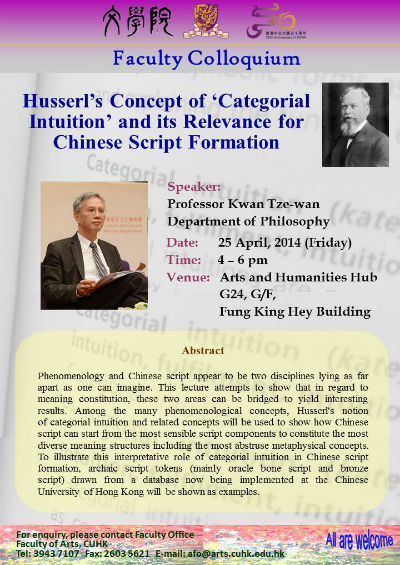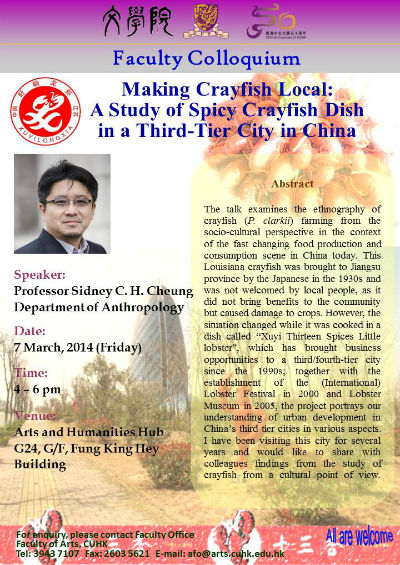Husserl’s Concept of ‘Categorial Intuition’ and its Relevance for Chinese Script Formation

Speaker: Kwan Tze-wan (Department of Philosophy)
| Date: | 25 April 2014 (Fri) |
| Time: | 4:00pm |
| Venue: | G24, Arts and Humanities Hub, Fung King Hey Building, CUHK |
| Language: | English |
| Abstract: | Phenomenology and Chinese script appear to be two disciplines lying as far apart as one can imagine. The lecture attempted to show that in regard to meaning constitution, these two areas can be bridged to yield interesting results. Among the many phenomenological concepts, Husserl's notion of categorial intuition and related concepts will be used to show how Chinese script can start from the most sensible script components to constitute the most diverse meaning structures including the most abstruse metaphysical concepts. To illustrate this interpretative role of categorial intuition in Chinese script formation, archaic script tokens (mainly oracle bone script and bronze script) drawn from a database now being implemented at the Chinese University of Hong Kong was shown as examples. |


Fieldwork in Huizhou and Ming Dynasty Orthodoxy

Speaker: Prof. John Lagerwey (Centre for China Studies)
| Date: | 11 April 2014 (Fri) |
| Time: | 4:00pm |
| Venue: | Activities Room, 2/F, Art Museum East Wing, Institute of Chinese Studies, CUHK |
| Language: | English |
| Abstract: | Everyone knows that Daoxue (neo-Confucianism) was enshrined as the orthodoxy of the Ming state by its founder, Zhu Yuanzhang. Few people are aware that he at the same time enshrined another orthodoxy: that of Zhengyi (Orthodox Unity) or Tianshi (Heavenly Master) Daoism, and even fewer are aware of the impact of this second Ming orthodoxy on Chinese cultural history. A recent thesis by Mark Meulenbeld details the history of this second orthodoxy for the first time. A recent book by Richard Wang shows how many Ming princes were initiated Daoists and invested heavily in the support of Daoist institutions. We can see the impact of Ming Daoism very clearly in a range of Daoist rites which seem to be unique to this area, among which the most startling is called gandiao, “chasing away the [ghost of a person] who has committed suicide by hanging himself.” |


Translation and Sino-British Relations in the 18th and 19th Centuries: The Translation of the Letter of Credence of the Macartney Mission (1792-93) as a Case Study

Speaker: Prof. Lawrence Wang-chi Wong (Department of Translation)
| Date: | 21 March 2014 (Fri) |
| Time: | 4:00pm |
| Venue: | Activities Room, 2/F, Art Museum East Wing, Institute of Chinese Studies, CUHK |
| Language: | English |
| Abstract: | Abstract: The talk discussed a long neglected case in Chinese translation history and the history of Sino-British relations in the 18th century, the translation of the Letter of Credence of the Macartney Mission. As the first diplomatic mission sent by the British to China, the Macartney Mission is an important historical event that has drawn much scholarly attention. But all studies on the event neglected one crucial link: the Chinese translation of the Letter of Credence. This neglect constitutes a major flaw in our understanding of the mission, because the Chinese version of the Letter of Credence was the only text from the British side that Qianlong could read directly, and it inevitably affected the Emperor’s conception of the mission. The talk analysed two different Chinese versions of the Letter of Credence, one of which was “unearthed” only recently, and explained the significance of the differences in translation. The case of the Macartney Mission was also used in the talk to illustrate the research project undertaken by the speaker in recent years, “Translation and Sino-British Relations in the 18th and 19th Centuries”. |


Making Crayfish Local: A Study of Spicy Crayfish Dish in a Third-Tier City in China

Speaker: Prof. Sidney C. H. Cheung (Department of Anthropology)
| Date: | 7 March 2014 (Fri) |
| Time: | 4:00pm |
| Venue: | G24, Arts and Humanities Hub, Fung King Hey Building, CUHK |
| Language: | English |
| Abstract: | The talk examined the ethnography of crayfish (P. clarkii) farming from the socio-cultural perspective in the context of the fast changing food production and consumption scene in China today. This Louisiana crayfish was brought to Jiangsu province by the Japanese in the 1930s and was not welcomed by local people, as it did not bring benefits to the community but caused damage to crops. However, the situation changed while it was cooked in a dish called “Xuyi Thirteen Spices Little lobster”, which has brought business opportunities to a third/fourth-tier city since the 1990s; together with the establishment of the (International) Lobster Festival in 2000 and Lobster Museum in 2005, the project portrays our understanding of urban development in China’s third tier cities in various aspects. The speaker has been visiting this city for several years and would like to share with colleagues findings from the study of crayfish from a cultural point of view. |


Realizing the Promise of Internationalization: Investing in Intercultural Learning on Campus

Speaker: Prof. Jane Jackson (Department of English)
| Date: | 21 February 2014 (Fri) |
| Time: | 4:00pm |
| Venue: | G24, Arts and Humanities Hub, Fung King Hey Building, CUHK |
| Language: | English |
| Abstract: | As internationalization efforts intensify, more and more CUHK students are participating in some form of education abroad. The number and diversity of incoming international exchange students is also transforming our campus. After reviewing the University’s internationalization aims and strategies, the talk centered on an interdisciplinary, learner-centered course, that draws on education abroad research. Intercultural transitions is designed to enrich and extend the intercultural learning of undergraduates with recent or current international experience. After reviewing the lessons learned from three offering of this course, the speaker briefly discussed other practical ways to enhance intercultural learning and foster meaningful interactions between local and international students both in and out of class. The talk underscored the merits of strengthening the connection between research and practice to help the University achieve the promise of internationalization. |


Hong Kong as an (In)Operative Community

Speaker: Prof. Pang Laikwan (Department of Cultural & Religious Studies)
| Date: | 14 February 2014 (Fri) |
| Time: | 4:00pm |
| Venue: | G24, Arts and Humanities Hub, Fung King Hey Building, CUHK |
| Language: | English |
| Abstract: | Many young residents begin to see Hong Kong less as an abstract global city in which they climb their individual social ladders than a community with living history, material existence, and daily intersubjective encountering. The meanings of living “here” pertain no longer just to the city’s provision of individualistic opportunities but also emotive embedding and social responsibilities. However, this new sense of communal belonging also breeds parochialism, inviting local members to show contempt against all foreign others. This talk hopes to provide some academic resources for us to develop a more productive and pluralistic politics to treasure yet intervene the idea of community. A focus would be the “Law,” something the Hong Kong people have taken for granted as a “core value” of this city. What exactly does the Rule of Law mean in the current Hong Kong – mainland tensions? How does a reinvestigation of the concept of the law might help us develop a “legal subjectivity” that opens up to others instead of closing down the community, as well as the meanings of Hong Kong to the PRC? |


On the social function of MA programmes -- the View from MA in Philosophy

Speaker: Prof. Lai Pan Chiu (Department of Cultural & Religious Studies)
| Date: | 24 January 2014 (Fri) |
| Time: | 4:00pm |
| Venue: | Lecture Hall 1, Swire Hall, Fung King Hey Building, CUHK |
| Language: | English |
| Abstract: | This first colloquium is in the form of a panel discussion on the topic of “從哲學系文學碩士課程看人文教育的社會功能”("On the social function of MA programmes -- the View from MA in Philosophy"). Through the viewing of a documentary produced by the Department of Philosophy to celebrate the 10th anniversary of their MA programme, the colloquium focused on the social function of humanities education. Professor Lai Pan Chiu, Associate Dean (Education) of the Faculty of Arts was chairing the event, with the following colleagues serving as discussants: Professors Chan Yuk Keung, Ho Che Wah, Lau Kwok Ying, Dr Ma Muk Chi, as well as Mr Kwok Wai Lun (film director). |


For those who would like to review the video archive of the talk, please contact the Faculty Office at 3943 7107.





